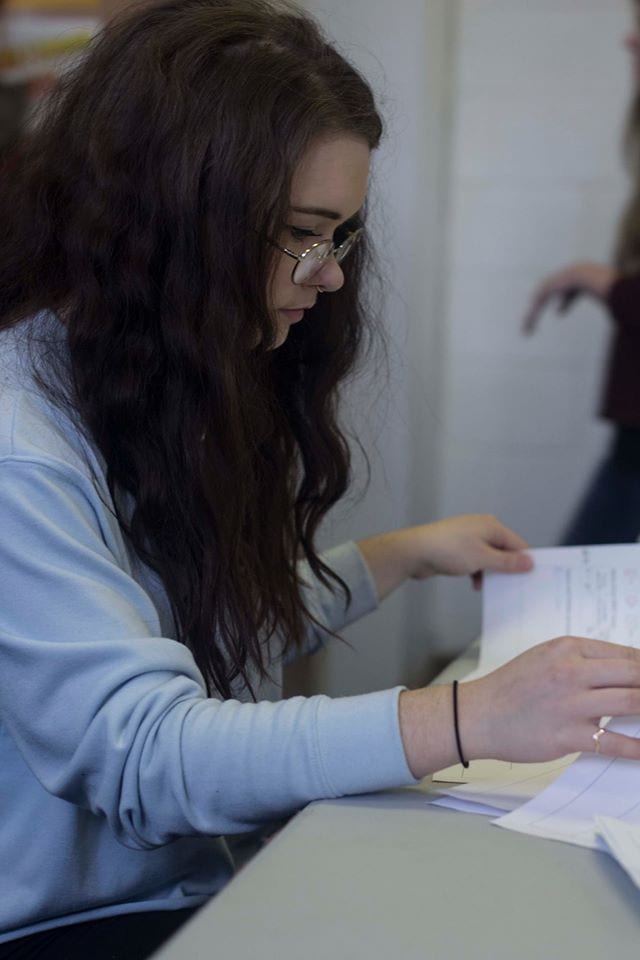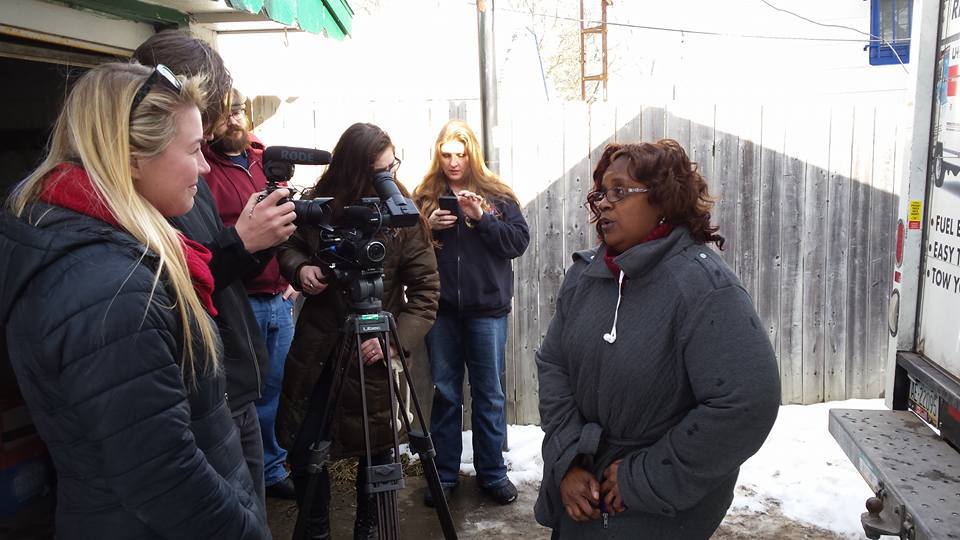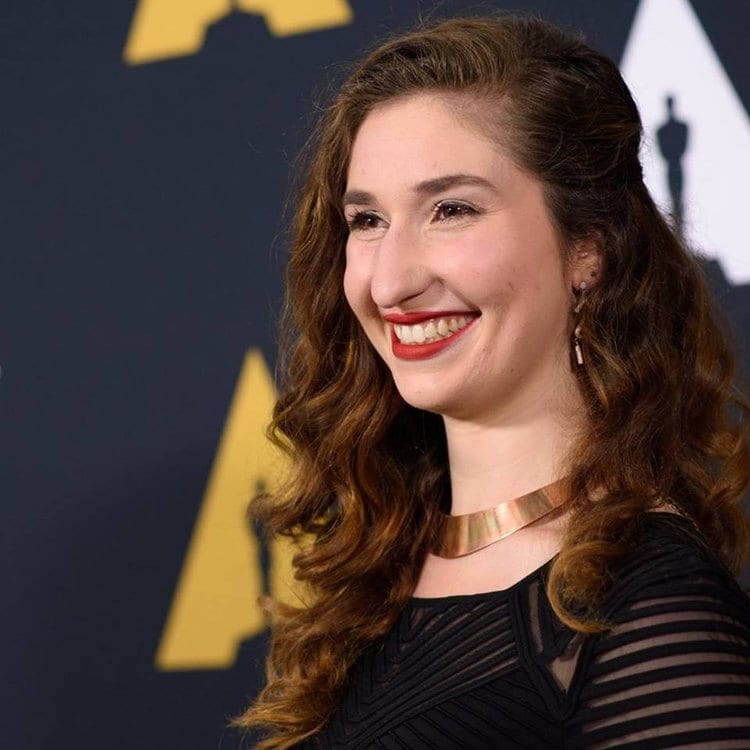The following has been reposted from agnès films with the authors’ permission.
Interview by Alexandra Hidalgo
Copy Editing and Posting by Sam Fegan
You are expanding your short film, From Flint: Voices from a Poisoned City, which you created for an undergraduate documentary filmmaking course at Michigan State University. What inspired you to make the original film?
Jenna: I really wanted to use the capstone documentary project as an opportunity to discuss areas of social injustice, so when our producer Liv Larsen and director of photography Izak Gracy presented the concept of focusing on the Flint water crisis, I was immediately on board. The fact that there were, and still are, people less than an hour away from me who couldn’t even trust the water in their own homes is disturbing and unacceptable. On top of that, this issue only got media buzz for a short while, and then faded into the back of everyone’s minds. We wanted to focus on individual people and depict their everyday lives and struggles to express to those unaffected that this crisis is not just about the politics of it all; it is about the people who have been poisoned and who will experience the negative effects of this negligence for generations to come. So, in short, to tell the story of those residents who feel forgotten in this time of terrific need.
Elise: To be honest, I was really scared to take on such a mammoth topic. I kept looking around and seeing stories being done by professional journalists that were so off the mark that it was really intimidating. They were being paid; how could five students do it better? I never wanted to be viewed as some opportunistic kid trying to take advantage of these people’s pain. We were there to tell the story that Flint wanted told, and that’s what made us different. As soon as we realized that there was a need there that wasn’t being filled, there was no question in my mind that we were doing the right thing for the right reasons.
Your short film version of From Flint not only won a Student Academy Award in 2016, but has had an impressive run on the film festival circuit, screening at DOC NYC and Hot Springs, among many others. What has the experience of having such a successful class project been like?
Jenna: Honestly, I feel like it wasn’t even real. It’s incredible to me that something I was a part of could be considered that impressive. The fact that it screened at Hot Springs and DOC NYC (which I got to attend!) is nuts. I met so many amazing filmmakers, and learned quite a bit about myself as well. Despite the film’s success, I don’t let myself forget that it is solely because of the hell these people are going through that I am receiving this praise. This is at the forefront of my mind while creating the feature version of this story. I don’t want success to outshine the message that these people have been wronged, and are still being wronged right now. My hope is that if this film does see success, it will motivate others to care about and assist the city of Flint.
Elise: I completely agree with Jenna. This film’s success was so weird to us. We just talked to people and tried to tell Flint’s story without adding our own bias and it kind of blew up overnight. I think one thing that I keep reiterating to the crew is that we are not making a film to win any awards. As soon as we start doing that, we’ve failed the city and the story. The Flint water crisis is shocking enough; it doesn’t need to be dramatized. As long as the people of Flint remain our priority, then we’re doing our jobs.
Why do you think the project needs to be expanded? What new story avenues are you pursuing in the feature version that you were unable to pursue in the original?
Elise: Things have gotten so much worse in Flint since the completion of the original, but no one is talking about it.
Jenna: This project needs to be expanded because this crisis isn’t even close to over. For some families that have been poisoned, it won’t be over for generations. People think it’s over and we want to remind everyone that it isn’t. We only had three months to create the short version of the documentary from start to finish. With that small time frame, we came up short in several ways. We want to hold ourselves accountable for the shortcomings of the original documentary and give ourselves time to tell a story that provides a well-rounded, honest depiction of these people. We hope we can do their stories justice in an even more effective way this time around.
Elise: Agreed, and to build on that … as a filmmaker, I always look at my past work with a very critical eye. The original short did a lot of great things, but there were things that it could do better. I think just showing the passage of time in the city will add a whole new level of depth to the project. I think it will really help viewers from across the country to understand the severity and universality of what is happening in Flint.
You are currently running a fundraising campaign for the feature version of From Flint. What will the campaign cover?
Jenna: We do have a complete breakdown of where the money is going on our Indiegogo page, but essentially it will cover all of the things we need to make this film happen. We need money for equipment, travel costs, food, pretty much everything to keep us going and make sure that this film is the best that it can be. Budget was a huge limiting factor for our short. It was almost impossible to get people to believe and invest in what we were doing. We hope that now since we have a little credibility, people will feel comfortable investing in our project and that we can really do this story justice with their help!
Elise: We do want to say that anyone looking to donate money to aid in the relief of the water crisis should not donate to our campaign, but to the links on our Indiegogo to organizations that we’ve worked with personally and trust. Donations to our campaign, however, will help us give this story the global visibility it needs and deserves.
From Flint tells a sadly prevalent story of bad policy decisions deeply hurting an entire population. What is it about the documentary genre that brings social justice stories to life?

Jenna: I think it’s the honesty behind the storytelling. Fictional reenactments of things like this can be heart-wrenching and inspiring, but something about hearing the story from a real person who has actually lived it and felt that pain of social injustice is something completely different. When you’re an outsider watching something that you think could never be real, and then have to keep remembering that it absolutely is real, it’s a unique feeling. It makes you think differently, like the story isn’t over when the movie ends, because those people are still out there. I could probably go on about this topic forever if given the chance so I’ll cool it for now, but I believe documentary really is the best way to bring social justice stories to life.
Elise: Documentaries have really grown in popularity in the last 10 years and I think a big part of that is because people are looking for sincere storytelling. You go to the movies and watch so many larger-than-life people doing crazy larger-than-life stuff … there’s a lot of beauty in seeing people who are different from you in 100 ways do the same things you do to get ready for bed or go to work. It’s unifying. It breaks down these “Us vs. Them” mentalities that we have. It really encourages empathy, which is so powerful in making change happen.
When people are asked to visualize feature documentary directors, they don’t usually imagine a collaboration between two women in their mid-twenties. What kind of reactions have you received from people as you work on your film and what do you think your gender and youth brings to your ability to tell this story?
Jenna: I think people have been surprised, but not in a negative way. Whenever I see young women out here making things happen I feel proud and excited for them. I would hope that that is how people view us. I think the fact that we have the energy and tenacity that can come with being a young woman pissed at the injustices of the world definitely gives us a different type of motivation. As people who can sometimes be written off in this field, I think we can use that as fuel to help others who are being neglected due to bullshit social constructs by using our medium to bring some of these horrific realities to light.
Elise: It’s been funny. We’ve been underestimated a lot, I think, but then when they see what we’ve made and how we present ourselves, people take us seriously very quickly. You go to film festivals and walk into the “filmmaker lounge” and you are the youngest person in the room and the only woman—I take a lot of satisfaction in that.
What strategies have you developed to make sure that your collaboration results in both of you feeling like your individual vision of the story is at least partially reflected in the final result?
Jenna: Elise is an absolute badass and I’m very lucky to have been asked to join her in tackling this project. We spent a ton of time in the editing room together while putting together the first film, so I know we are capable of compromise and communication. A lot of it has to do with trust, I think. Even though I may think something won’t work or have a specific idea in my head, sometimes I have to sit back and just trust that she knows what she’s talking about, which she does. We just started and we’ve already had conversations like that. I don’t think we’ll ever be able to completely avoid butting heads at some points, considering we’re both loud and opinionated and pretty unafraid of being that way whenever and wherever, but, like I said, I trust her. I have confidence that we will be on the same page and we’ll be able to create something that reflects us as filmmakers both individually and as a team.
Elise: Honestly, Jenna and I co-directed the short as well. It was so easy to describe everyone else’s roles, but when it came to her, she did everything. She was always there with new information or a solution to a problem. She put in just as much work as I did when it came to constructing the story. We were just working so hard and so fast, it wasn’t until after we’d finished that I realized I’d had a co-director. So when we started talking seriously about an expansion, my one condition was that we promote Jenna. I love working with her. It’s really wonderful to have someone to bounce ideas off of. I think one thing that helps a lot in the story is that it’s not our story, it’s Flint’s story. Jenna and I are just trying to figure out how to tell it, but when it really comes down to it, our individual visions are always going to come second to what the people of Flint need to say to the general population.

What advice do you have for other young women wanting to tell socially relevant stories like the one you’re telling?
Jenna: JUST DO IT. (Hi, Nike, please don’t sue me.) Honestly, if something is that important to you, you have to do it. If you think people are being mistreated and no one is paying attention when they should, try your best to make them do so. You certainly don’t have to be an incredible filmmaker to tell stories with film and make people listen. You just have to be passionate, pay attention, and most importantly, listen. Listen to the community and the individuals, listen to your critics, and don’t make assumptions about people or places because you will learn more about your own subject that way. I know I learned a lot while working on the first short doc, and now I’m trying to share that knowledge, along with what I will learn this time around. Don’t be afraid to step outside of your comfort zone and learn something, because if you don’t learn from the sources of the situation, you won’t be able to tell a story that is honest and sincere.
Elise: Yes! Make art. Whatever it is, you don’t have to be good at it. Just do what you’re passionate about and the rest will fall into place with time and practice. Challenge yourself and never let people tell you that you aren’t good enough, because you’ll get better. It’s not just filmmaking either—all kinds of art and expression require practice and passion. Take risks and ask for help.
You can find more information about Jenna and Elise’s From Flint: Voices from a Poisoned City campaign on their Facebook page or their website, and you can help support their campaign through their Indiegogo page. You can also check out Alexandra’s profile.
About the Writer

Alexandra Hidalgo is an award-winning Venezuelan filmmaker, theorist, and editor whose documentaries have been official selections for film festivals in 14 countries and been screened at universities around the United States. Her videos and activist writing have been featured on The Hollywood Reporter, IndieWire, NPR, and Women and Hollywood. She is assistant professor of Writing, Rhetoric, and American Cultures and co-director of the Doc Lab at Michigan State University. Her video book Cámara Retórica: A Feminist Filmmaking Methodology for Rhetoric and Composition received the 2017 Computers and Composition Distinguished Book Award. Her academic video essays have been published in Enculturation, Kairos, Present Tense, and Peitho, among others. She is the co-founder and editor-in-chief of agnès films: supporting women and feminist filmmakers and of constellations: a cultural rhetorics publishing space.



